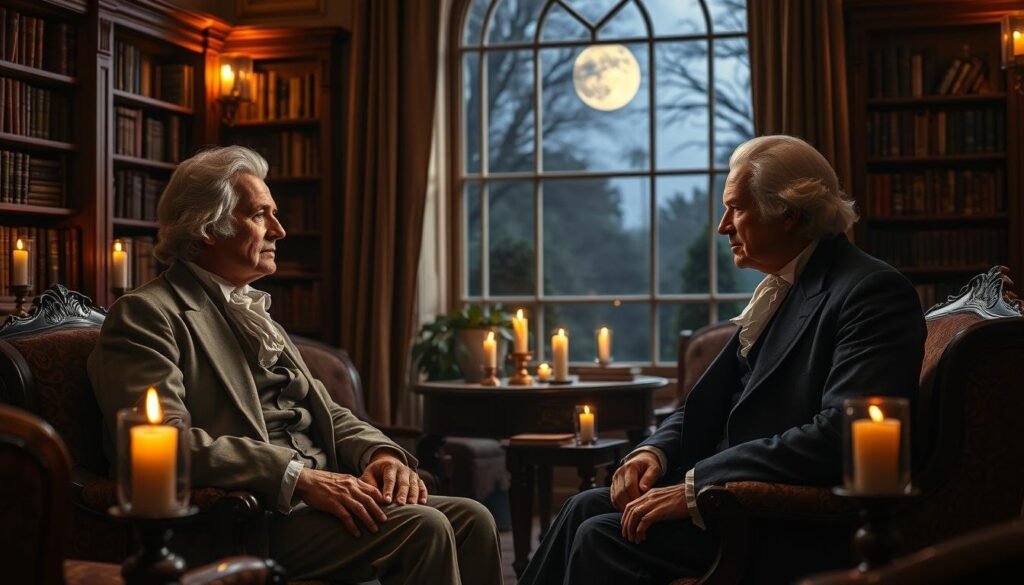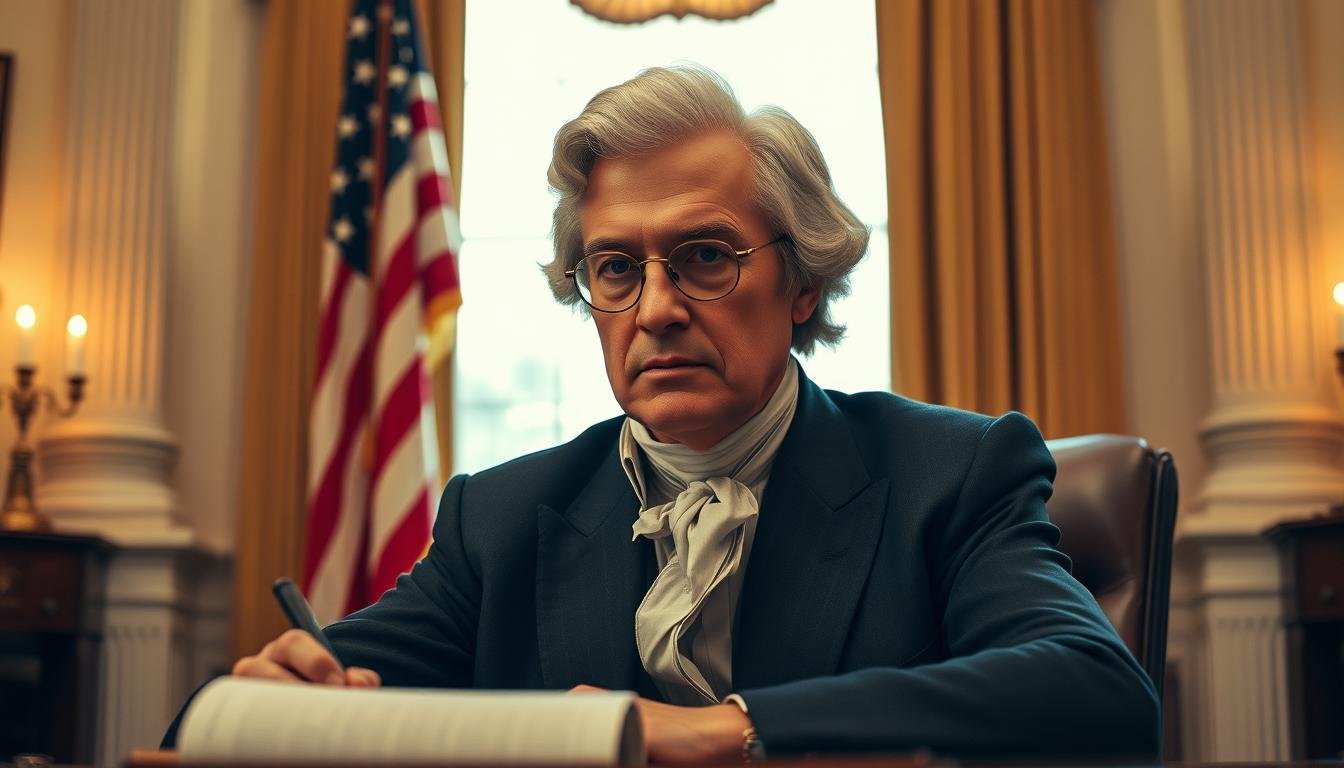President Jefferson Run for a Third Term: Thomas Jefferson’s decision not to pursue a third presidential term might puzzle you. It was shaped by his vision for the presidency and the effects of long-term leadership.
Jefferson dealt with many challenges during his presidency. These tests showed his dedication to the American republic’s values. His choice to leave after two terms was a key moment in U.S. history. It set a precedent for future leaders and the idea of presidential term limits.
Learning about this crucial moment offers a deeper understanding of the historical context. It also reveals the factors that influenced Jefferson’s decision. This knowledge helps us see how the U.S. political landscape evolved.
Contents
- 1 Thomas Jefferson’s Presidency: A Brief Overview
- 2 The Precedent Set by George Washington
- 3 Why Did President Jefferson Not Run for a Third Term?
- 4 Jefferson’s Health and Personal Considerations
- 5 Political Challenges Facing Jefferson
- 6 Jefferson’s Relationship with James Madison
- 7 The Two-Term Tradition and Its Evolution
- 8 Conclusion: President Jefferson Run for a Third Term
- 9 FAQ
- 9.1 What were the main reasons behind Thomas Jefferson’s decision not to run for a third term as President?
- 9.2 How did George Washington’s decision not to seek a third term impact Thomas Jefferson’s choice?
- 9.3 What role did Jefferson’s health and personal considerations play in his decision not to run for a third term?
- 9.4 How did the political challenges facing Jefferson during his presidency affect his decision?
- 9.5 What was the significance of Jefferson’s relationship with James Madison in his decision not to run for a third term?
- 9.6 How did Jefferson’s decision contribute to the evolution of the two-term tradition?
- 9.7 What is the lasting impact of Jefferson’s decision on presidential terms?
Thomas Jefferson’s Presidency: A Brief Overview
Thomas Jefferson’s presidency was a time of big changes and growth for the country. You will learn how he led the nation through tough challenges and great opportunities.
Federalist Opposition
Jefferson faced strong opposition from the Federalists during his time in office. They disagreed with his views on states’ rights and limited government. The Federalists saw Jefferson’s Democratic-Republican Party as a threat to their vision of a strong central government. This opposition was a big part of his presidency.
The Louisiana Purchase
One of Jefferson’s biggest achievements was the Louisiana Purchase. In 1803, the U.S. bought about 828,000 square miles of land west of the Mississippi River for $15 million. This deal almost doubled the size of the United States.
| Year | Event | Significance |
|---|---|---|
| 1801 | Thomas Jefferson becomes President | Marked the beginning of Democratic-Republican leadership |
| 1803 | Louisiana Purchase | Doubled the size of the United States |
Jefferson’s presidency was filled with important events, like the Louisiana Purchase and the ongoing Federalist opposition. These factors greatly influenced his decisions, including his choice not to run for a third term.
The Precedent Set by George Washington
George Washington chose not to run for a third term. This showed his dedication to the American Republic’s principles. His decision was key because it set a precedent for future presidents, including Thomas Jefferson.
Washington believed in rotation in office and wanted to keep the presidency from becoming too powerful. This belief guided his choice.
Washington’s actions were rooted in Republican values. These values stressed the need to limit power and prevent one person from dominating the government. By not running for a third term, Washington upheld these values and kept the office’s integrity.
Republican Values and Rotation in Office
The idea of rotation in office was at the heart of the Republican ideology. It was thought that regular changes would stop power from building up. This would keep the government accountable to the people.
Washington’s commitment to this idea was a strong example for future presidents.
| Key Principles | Description | Impact |
|---|---|---|
| Rotation in Office | Preventing the accumulation of power | Ensured accountability to the people |
| Republican Values | Limiting power and preventing dominance | Maintained the integrity of the office |
| Precedent Setting | Establishing a tradition for future presidents | Influenced Thomas Jefferson’s decision-making |
The table shows Washington’s decision was guided by Republican values and rotation in office. These principles not only shaped his choice but also had a lasting effect on the presidency. They influenced future leaders like Thomas Jefferson.
Why Did President Jefferson Not Run for a Third Term?
Thomas Jefferson decided not to run for a third term as President. What made him choose this path? You will learn about the reasons behind his decision, including his strong beliefs and personal thoughts.
Letters to Colleagues Explaining His Decision
Jefferson’s letters to his colleagues offer a glimpse into his mind. In a letter to John Tyler, he talked about his dedication to the American Revolution’s principles. He also mentioned not wanting to stay in office too long, fearing it could lead to a monarch-like situation.
Jefferson’s decision was not made easily. He considered the political situation and his own feelings before deciding. His letters show a man deeply committed to democracy.
Jefferson also respected George Washington’s decision to step down after two terms. He saw it as a key moment for the presidency.
By not running again, Jefferson followed Washington’s lead. This set a big example for future presidents. His choice showed his faith in democracy and his effort to prevent power from becoming too concentrated.
Jefferson’s Health and Personal Considerations
Jefferson’s health was a big reason he chose not to run for a third term. His presidency was tough, and his health became a major worry.
His Intellectual Pursuits and Family Life
Jefferson loved to read, learn, and build things. His passion for literature, science, and architecture was a big part of his life. It brought him comfort when things got hard.
His family was also important to him. His daughter’s health and family duties were key in his choices.
| Personal Considerations | Influence on Decision |
|---|---|
| Health Issues | Significant concern |
| Family Obligations | Important factor |
| Intellectual Pursuits | Provided solace |
Political Challenges Facing Jefferson
Thomas Jefferson’s presidency was filled with political hurdles. He had to deal with many issues that tested his leadership. These challenges led him to decide not to run for a third term.
Foreign Policy Complications
Foreign policy was a big challenge for Jefferson. The Napoleonic Wars and British Orders in Council threatened American trade and freedom. His response, the Embargo Act of 1807, hurt the economy and American merchants.
Jefferson also faced declining public support. The Embargo Act’s economic impact and other issues lowered his popularity. His party, the Democratic-Republicans, faced strong opposition from the Federalists.
These challenges, both at home and abroad, greatly influenced Jefferson’s decisions. His choice not to seek a third term shows the difficulties leaders face in times of crisis.
Jefferson’s Relationship with James Madison
Exploring Jefferson’s presidency, we see James Madison’s big impact. Their bond was based on respect and trust. This was key in shaping Jefferson’s choices as president.
Their Long-Standing Political Alliance
Jefferson and Madison worked together for years. They shared political views and supported each other. They even helped write the Declaration of Independence together.
| Year | Event | Impact on Jefferson’s Presidency |
|---|---|---|
| 1776 | Drafting of the Declaration of Independence | Established Jefferson as a key figure in American politics |
| 1801 | Jefferson becomes President | Madison’s influence helped shape Jefferson’s early decisions |
| 1808 | Madison succeeds Jefferson as President | Demonstrated the strength of their political alliance |
Madison’s advice was crucial to Jefferson. It helped him navigate early 19th-century politics.

The bond between Jefferson and Madison was deep. It shaped their careers and American history. Their alliance shows the strength of working together and respecting each other.
The Two-Term Tradition and Its Evolution
The two-term tradition is a key part of American democracy. It started with Thomas Jefferson, who chose to leave office after two terms. This was a big change from the fear of a president staying in office forever.
Jefferson’s decision was not a law, but it set a strong example. It was followed by many presidents until Franklin D. Roosevelt, who served four terms.
After Roosevelt’s long time in office, a formal limit was needed. This led to the 22nd Amendment in 1951. It made constitutional term limits for the presidency, limiting a president to two terms.
This change shows how American governance can grow and change. It shows the system’s ability to adapt to new needs.
The 22nd Amendment and Constitutional Term Limits
- The 22nd Amendment was ratified on February 27, 1951.
- It ensures that no person can be elected to the presidency more than twice.
- This amendment made the two-term tradition a law. It stops any president from staying in office longer than two terms.
Learning about the history and laws behind presidential term limits helps us understand the U.S. political system. It shows how the system has checks and balances.
Conclusion: President Jefferson Run for a Third Term
Thomas Jefferson’s choice not to run for a third term was shaped by many factors. These included the example set by George Washington and his own personal and political views.
Jefferson’s impact on presidential term limits is huge. His decision not to run for a third term set a precedent. This precedent was later made into the 22nd Amendment to the US Constitution.
The two-term tradition Jefferson helped start has lasted over two centuries. It has shaped how American leaders view the presidency. Reflecting on Jefferson’s legacy shows his decision was a key moment in American history. It remains important today.
See Also: How Was Andrew Jackson Different From Previous Presidents?
FAQ
What were the main reasons behind Thomas Jefferson’s decision not to run for a third term as President?
Thomas Jefferson didn’t want to run for a third term for several reasons. He followed George Washington’s lead, sticking to Republican values and the idea of rotating in office. His health, personal life, and political hurdles also mattered.
How did George Washington’s decision not to seek a third term impact Thomas Jefferson’s choice?
George Washington’s choice set a precedent for future presidents, including Jefferson. Jefferson decided not to run for a third term, keeping the two-term tradition alive.
What role did Jefferson’s health and personal considerations play in his decision not to run for a third term?
Jefferson’s health and personal life were key factors. He wanted to focus on his family and intellectual interests, which were overshadowed by the presidency.
How did the political challenges facing Jefferson during his presidency affect his decision?
Jefferson faced tough times in foreign policy and lost public support. These issues might have made a third term seem less appealing.
What was the significance of Jefferson’s relationship with James Madison in his decision not to run for a third term?
Jefferson’s bond with James Madison was crucial. Madison’s influence likely played a part in Jefferson’s decision not to seek a third term.
How did Jefferson’s decision contribute to the evolution of the two-term tradition?
Jefferson’s choice to not run for a third term solidified the two-term tradition. This tradition later became a constitutional rule with the 22nd Amendment.
What is the lasting impact of Jefferson’s decision on presidential terms?
Jefferson’s decision has shaped American politics, influencing the idea of presidential term limits. His decision not to run for a third term is a key moment in this tradition.

Hi, I am Tatum Bradford from Washington. I have a background in political science and work as a senior revenue officer. I love learning about U.S. presidents and sharing interesting facts about political history.

